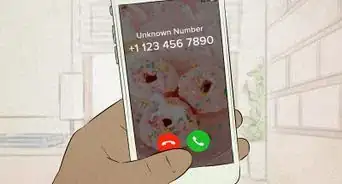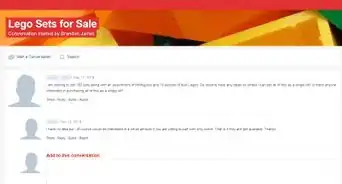X
wikiHow is a “wiki,” similar to Wikipedia, which means that many of our articles are co-written by multiple authors. To create this article, 22 people, some anonymous, worked to edit and improve it over time.
There are 8 references cited in this article, which can be found at the bottom of the page.
This article has been viewed 73,681 times.
Learn more...
This article contains instructions and information that will help you reduce the number of telephone calls that you receive from telemarketers on your residential phone.
Steps
-
1Limit the amount of personal information that you provide to "strangers". If someone asks for your name and address, they can easily find your phone number from the telephone directory. Protect your personal information as "need-to-know".[1]
-
2Do not call to respond to general media advertisements, television or newspaper ads. The company can legitimately collect your number, through caller ID, and may illegitimately share it with other companies.Advertisement
-
3Learn about the privacy policy of any company that collects your personal information. If a company cannot guarantee that they will not sell or share your phone number or other information, do not do business with them at all.[2]
-
4Do not provide your phone number in product registrations. Leave that line blank if it is allowed.
-
5Register your phone number with the FTC's National Do Not Call list. You may register three personal phone numbers at a time, including cell phone numbers.[3]
-
6You may call 1-888-382-1222 from the phone you want to register as an alternative to the Internet method for the Do Not Call Registry.[4]
-
7Be careful with whom you do business. Some companies violate the Do Not Call registry by falsely stating that you have recently transacted business with them or that you have an active account with their company.
-
8Do not hire any third-party companies to register your phone numbers with the Do Not Call list. This is a scam. A telemarketer calls your number to sell you anti-telemarketing services? Yep.
-
9Most companies must remove you from their calling list when you request it. When speaking to a telemarketer, ask for the name of the company and the name of the person to whom you are speaking. Ask for a phone number for the company, so that you can confirm that the call is legitimate. Then, politely and firmly say, "Place me on your do not call list."
-
10Report telemarketing violations and suspected scams to the Federal Trade Commission and your state Attorney General.[5]
-
11Use Google. Entering an unknown number in a search engine may give you some hints about its owner. Many online report services also allow you to report and share your experience with other users.
-
12Setup phone call filtering. Most phone companies offer "anonymous call rejection". If the calling party is not displaying caller id information for whatever reason your phone will not ring. Instead the calling party will be confronted by a phone company system that will do one or more of the following: prompt the caller to release caller id information, prompt the caller to leave a very short voice message which is subsequently played to you giving you a chance to accept or dump the call, instruct the caller to call back revealing caller id information. This will weed out a great many collections calls. There are a number of hardware devices that can accomplish this without invoking a monthly fee.[6]
-
13Setup your phone system as WhiteList-Only. _ Numbers not on your approved list will not ring your phone. As collection agencies often employ caller id spoofing, sending fake- or alternate caller id information to trick you into answering. However, WhiteList-Only home phone setup puts a swift end to this [illicit] collections terrorism. _ WhiteList-Only can be accomplished with a hardware device for as little as $50USD with no monthly fees. Alternatively once can switch phone service from Land Lind (conventional phone system) to VoIP (Voice over IP). The latter requires an internet connection and performs best on a broadband link; dial-up internet is generally unworkable. There are a variety of home VoIP providers allowing WhiteList-Only setup for as little as $8 USD monthly. _ If one is adventurous one can setup a home PBX using Asterisk, an open source software phone system usually requiring a dedicated computer. PBX in a Flash is one such flavor of Asterisk and is well suited to the above average computer user. Consider the free (open source software) PBX in a flash, Orgasmatron build, for easy "out of the box" FULL CONTROL of YOUR home phone. Your Phone, your time, YOUR TERMS. _ WhiteList-only has the further advantage of being able to list your contact number publicly [physically or on the interweb] with the guarantee that you will not receive calls from unknown parties.
-
14Setup your phone system as BlackList unwanted. Similar to WhiteList-only BlackList allows all calls except those explicitly blocked. Land Line phone service typically limits the customer to twenty blocked numbers whereas home VoIP providers or home PBX has no such limit. Additionally the latter two often allow wildcard blacking. This allows one to block all calls from toll free numbers: 800*, 866*, 877*, 888*. As most collection agencies start harassing from toll free numbers one greatly reduces the amount of harassment with a few rules. One has a wide variety of options how to handle blocked callers, whether in WhiteList- or BlackList mode: always busy, infinite ring, fake out of service error, voicemail prompt that does not allow messages to be recorded, and even redirecting callers to another number.[7]
-
15Setup your phone system with BOTH WhiteList-only and BlackList unwanted.[8]
Advertisement
Community Q&A
-
QuestionWho can I call to report unwanted calls?
 Community AnswerIf it is really urgent, you can always call the Police Department, who will be able to investigate it.
Community AnswerIf it is really urgent, you can always call the Police Department, who will be able to investigate it.
Advertisement
Warnings
- While you have a moral obligation to pay your debts some companies, most notably Time Warner, have a tendency to BOTH illicitly bill you and to immediately turn over disputed bills to collection agencies. With illicit billing they are unlikely to sue as they would be required to produce EVIDENCE of the debt: since none likely exists they will hire firms to terrorize you into payment compliance. Why bother when you can simply ignore them in a few steps.⧼thumbs_response⧽
Advertisement
References
- ↑ https://www.usa.gov/telemarketing
- ↑ https://lifehacker.com/im-a-telemarketer-heres-how-to-get-rid-of-me-1540911401
- ↑ https://www.consumer.ftc.gov/articles/0108-national-do-not-call-registry
- ↑ https://www.consumer.ftc.gov/articles/0108-national-do-not-call-registry
- ↑ https://www.ftc.gov/faq/consumer-protection/submit-consumer-complaint-ftc
- ↑ https://www.fcc.gov/consumers/guides/stop-unwanted-robocalls-and-texts
- ↑ https://www.pcmag.com/article/331825/how-to-block-a-number-on-any-phone
- ↑ https://www.consumer.ftc.gov/articles/how-block-unwanted-calls
- The FTC National Do Not Call Registry home page
About This Article
Advertisement












-Step-13.webp)



























































